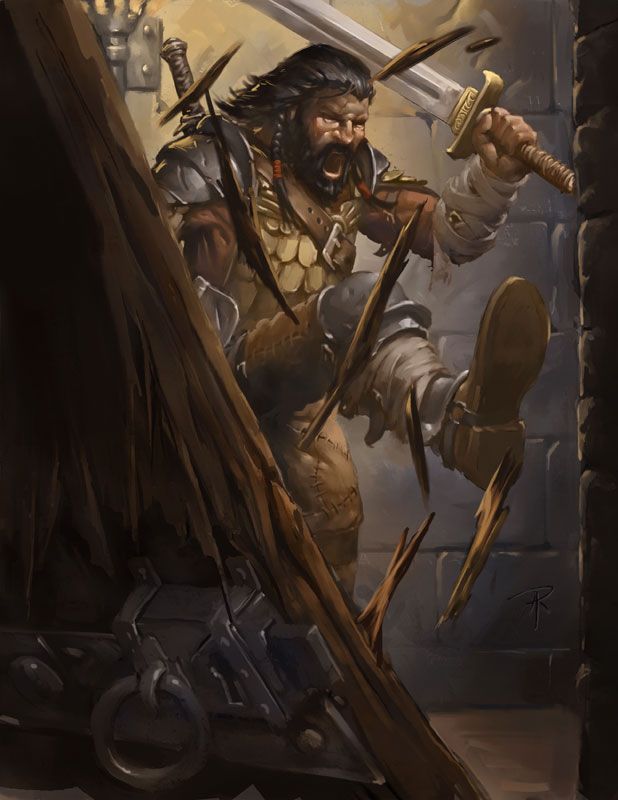Difference between revisions of "Primary Attributes"
Tao alexis (talk | contribs) |
Tao alexis (talk | contribs) |
||
| (4 intermediate revisions by the same user not shown) | |||
| Line 1: | Line 1: | ||
| − | ''' | + | [[File:Primary-attributes.jpg|right|490px|thumb]] |
| + | '''Primary attributes''' are the defining [[Ability Stats|ability statistic]] of each [[Character Class|character's class]], that underlie the character's capabilities while affecting success in the game world. Primary attributes play a pivotal roll in [[Character Creation|character creation]] and game play. | ||
| + | __TOC__ | ||
| + | A [[Fighter (class)|fighter]], for example, has the primary attribute of [[Strength (ability stat)|strength]]. The minimum strength to become a fighter is 9. This is not only a minimum limit when assigning ability stats to the character, but a recognition than any fighter with a less than 9 strength would be a very poor combatant. Thus when creating a fighter, the player is encouraged to allocate the character's highest roll to strength, because this would be that character's greatest need. | ||
| − | + | == Experience Bonuses == | |
| + | There are seven distinct character classes that offer a notable 10% [[Experience (X.P.)|experience]] bonus to characters whose primary attribute surpasses a specified threshold. These classes include [[Cleric (class)|clerics]], [[Druid (class)|druids]], fighters, [[Mage (class)|mages]], [[Paladin (class)|paladins]], [[Ranger (class)|rangers]] and [[Thief (class)|thieves]]. | ||
| − | + | Two of these require a strength of 16 or better in order for the bonus to be received: fighters and paladins. A ranger requires that both strength and [[Intelligence (ability stat)|intelligence]] be at least 16. Mages require a 16 intelligence; clerics and druids require a 16 [[Wisdom (ability stat)|wisdom]]; thieves require a 16 [[Dexterity (ability stat)|dexterity]]. Four classes cannot receive an experience bonus, regardless of their stats: [[Assassin (class)|assassins]], [[Bard (class)|bards]], [[Illusionist (class)|illusionists]] and [[Monk (class)|monks]]. | |
| − | '' | + | == Constitution & Charisma == |
| + | [[Constitution (ability stat)|Constitution]], although not classified as a primary attribute for any particular class, frequently emerges as the most advantageous choice for a character's second-highest roll. This is due to its substantial influence on a character's [[Hit Points|hit points]] and overall [[Disease|health]], making it a crucial consideration in character development. | ||
| − | + | [[Charisma (ability stat)|Charisma]] is the primary ability for bards. It's also of particular benefit to paladins and druids, and to a lesser extent to all players, as charisma can open doors and win [[Morale|loyalty]] and [[Follower|followers]] through game play. | |
| − | |||
| − | |||
| − | |||
| − | |||
| − | |||
| − | + | See also,<br> | |
| − | + | [[Multi-class Characters]]<br> | |
| − | + | [[Player Characters]] | |
| − | <br | + | |
| − | + | [[Category: Reviewed]] | |
| − | |||
| − | |||
| − | |||
| − | |||
| − | |||
| − | |||
| − | |||
Latest revision as of 20:13, 6 November 2023
Primary attributes are the defining ability statistic of each character's class, that underlie the character's capabilities while affecting success in the game world. Primary attributes play a pivotal roll in character creation and game play.
A fighter, for example, has the primary attribute of strength. The minimum strength to become a fighter is 9. This is not only a minimum limit when assigning ability stats to the character, but a recognition than any fighter with a less than 9 strength would be a very poor combatant. Thus when creating a fighter, the player is encouraged to allocate the character's highest roll to strength, because this would be that character's greatest need.
Experience Bonuses
There are seven distinct character classes that offer a notable 10% experience bonus to characters whose primary attribute surpasses a specified threshold. These classes include clerics, druids, fighters, mages, paladins, rangers and thieves.
Two of these require a strength of 16 or better in order for the bonus to be received: fighters and paladins. A ranger requires that both strength and intelligence be at least 16. Mages require a 16 intelligence; clerics and druids require a 16 wisdom; thieves require a 16 dexterity. Four classes cannot receive an experience bonus, regardless of their stats: assassins, bards, illusionists and monks.
Constitution & Charisma
Constitution, although not classified as a primary attribute for any particular class, frequently emerges as the most advantageous choice for a character's second-highest roll. This is due to its substantial influence on a character's hit points and overall health, making it a crucial consideration in character development.
Charisma is the primary ability for bards. It's also of particular benefit to paladins and druids, and to a lesser extent to all players, as charisma can open doors and win loyalty and followers through game play.
See also,
Multi-class Characters
Player Characters
